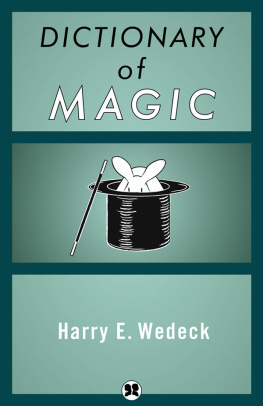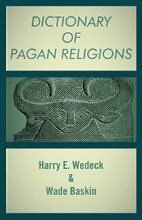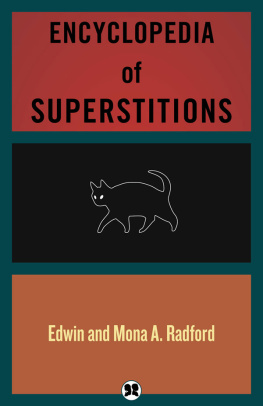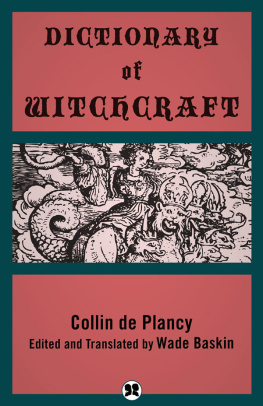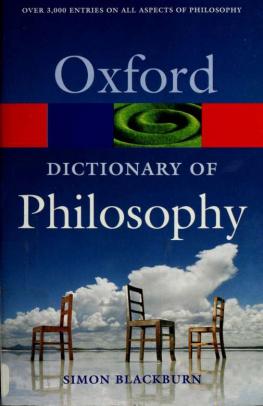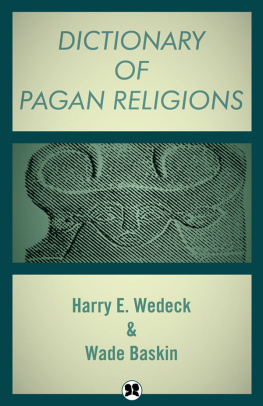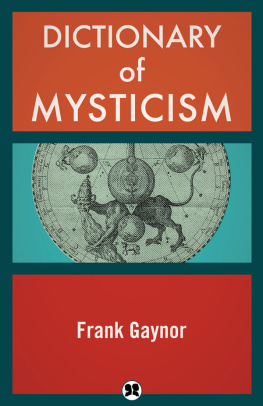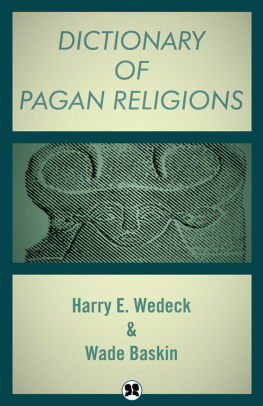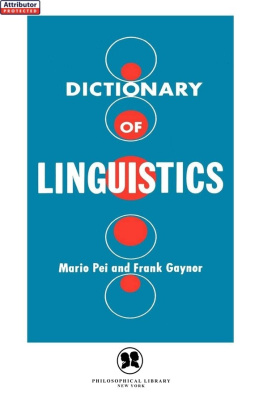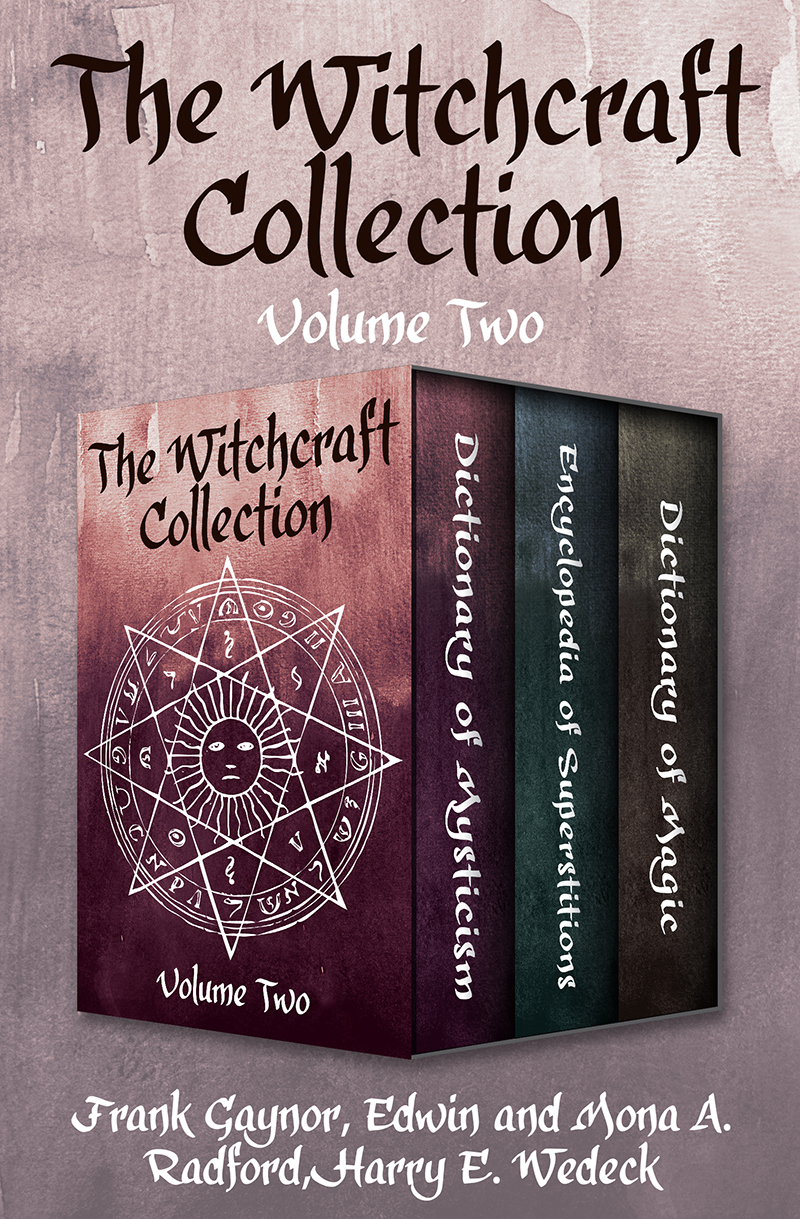
The Witchcraft Collection Volume Two
Dictionary of Mysticism, Encyclopedia of Superstitions, and Dictionary of Magic
Frank Gaynor, Edwin and Mona A. Radford, Harry E. Wedeck

CONTENTS

Find a full list of our authors and
titles at www.openroadmedia.com
FOLLOW US
@OpenRoadMedia





Philosophical Librarys mission is to reintroduce readers to books of lasting value by the intellectual icons of the twentieth century, including Albert Einstein, Jean-Paul Sartre, Kahlil Gibran, and Andr Gide.
FIND OUT MORE AT
WWW.PHILOSOPHICALLIBRARY.COM
FOLLOW US:
@PhilLibrary
Facebook.com/PhilosophicalLibrary
PhilosophicalLibrary.Tumblr.com
Philosophical Library is one of a select group of publishing partners of Open Road Integrated Media, Inc.
All rights reserved, including without limitation the right to reproduce this ebook or any portion thereof in any form or by any means, whether electronic or mechanical, now known or hereinafter invented, without the express written permission of the publisher.
Dictionary of Mysticism Copyright 1953 by Philosophical Library, Inc.
Encyclopedia of Superstitions Copyright 2007 by Philosophical Library, Inc.
Dictionary of Magic Copyright 1956 by Philosophical Library, Inc.
Cover design by Mauricio Daz
ISBN: 978-1-5040-6042-4
Philosophical Library
119 W. 40th Street
New York, NY 10018
www.philosophicallibrary.com

This edition published in 2019 by Open Road Integrated Media, Inc.
180 Maiden Lane
New York, NY 10038
www.openroadmedia.com


ACKNOWLEDGMENTS
The editor takes great pleasure in expressing grateful acknowledgment and thanks to the following authors and publishers for their permission to use copyrighted material in the preparation of this volume:
George Allen and Unwin Ltd., London, publishers of A Dictionary of the Sacred Language of All Scriptures and Myths by G. A. Gaskell.
Wing Anderson, Los Angeles, Calif., publisher of Oahspe (see p.127).
The de Laurence Co., Inc., Chicago, Ill., publishers of The Great Book of Hindu Magic and East Indian Occultism and The Book of Secret Hindu Ceremonial and Talismanic Magic by L. W. de Laurence.
Duke University Press, Durham, N. C., and the editors of The Journal of Parapsychology.
Dr. Nandor Fodor, author of Encyclopaedia of Psychic Science. Marc Edmund Jones, author of Occult Philosophy (David McKay Co., Philadelphia, Pa.).
Library Publishers, New York, N. Y., publishers of Swans Anglo-American Dictionary.
Philosophical Library, Inc., New York, N. Y., publishers of Hindu Philosophy by T. Bernard, An Encyclopedia of Astrology by N. de Vore, An Encyclopedia of Religion by V. Ferm (ed.), Forgotten Religions by V. Ferm (ed.), Introduction to Comparative Mysticism by J. de Marquette, The Splendour That Was Egypt by M. A. Murray, Dictionary of Philosophy by D. D. Runes (ed.), and Christian Science and Philosophy by H. W. Steiger.
The Rosicrucian Order (AMORC), San Jose, Calif., publishers of The Rosicrucian Manual by H. Spencer Lewis, Ph.D., F.R.C. George Routledge and Sons, Ltd., London, publishers of An Encyclopaedia of Occultism by Lewis Spence.
Schocken Books, Inc., New York, N. Y., publishers of Tales of the Hasidim by M. Buber.
Theosophical University Press, Pasadena, Calif., publishers of The Key to Theosophy by H. P. Blavatsky.
The Yogi Publication Society, Chicago, Ill., publishers of The Philosophies and Religions of India by Yogi Ramacharaka.
A
Aarons rod: The rod, or wand, with a serpent twined round it, which was used in the Mosaic ceremony of initiation; it appears to have contained the sacred fire. Now commonly employed as an emblem signifying a physician; similar to the caduceus of Hermes.
Abbadon: The Hebrew name of the bottomless pit, the place of the lost in Sheol; the abyss of hell.
ABC of the Devil: Handwritten books for the use of magicians and sorcerers.
Abhasa: A Sanskrit term (literally meaning shining forth ) for the cosmopsychological process which takes place as the One becomes the Many, as it is described by the philosophical system called Trika (q.v.).
Abhasana: The same as abhasa (q.v.).
Abhava: Sanskrit for non-being, non-existence. In Hindu philosophy, a means of correct knowledge defined as the deduction of the existence of one of two opposite things from the non-existence of the other.
Abheda: A Sanskrit term (literally meaning indistinct ) for identity, used especially in reference to any philosophy which denies the distinctness of spiritual and material, or divine and human principles.
Abhiseka: In Hinduism, the ceremonial bathing in sacred waters. In Buddhism, the tenth stage of perfection. The term is used also for the anointment of kings and high officials upon their ascension to power or as a recognition of some signal achievement.
Abidharma: The third part of the Buddhist Tripitaka (q.v.) containing lessons in metaphysics and occultism.
Abigor: In demonography, the name of a powerful demon, high-ranking in the infernal empire.
Abominable snowmen: A legendary race of superhuman giants, hostile to man, inhabiting the snowy slopes of the Himalayas.
Abracadabra: A magic word. A triangular arrangement of its letters worn on an amulet is believed by occultists to bring health and ward off disease.
Abraxas: A magic word, said to be the name of a god, the seven letters of which form the number 365, the number of days in a year. The word engraved on a gem or stone is considered by occultists to constitute a very potent charm.

